Healthcare Law Report: NZ Healthcare System and Professional Practice
VerifiedAdded on 2021/04/24
|10
|2505
|80
Report
AI Summary
This report delves into the intricacies of healthcare law within the New Zealand context, examining the roles of key institutions such as the Health and Disability Commissioner and the Human Rights Review Tribunal. It differentiates between civil and criminal law, highlighting their respective applications in healthcare settings, particularly concerning cases of negligence and medication errors. The report analyzes the legal frameworks governing healthcare professionals, including the Code of Health and Disability Services Consumers’ Rights and the Health Practitioners Competence Assurance Act 2003, emphasizing the rights and responsibilities of both consumers and providers. It explores the implications of these laws on professional nursing practice, emphasizing the importance of adherence to ethical standards, patient rights, and legal obligations to prevent errors and ensure quality care. The report underscores the significance of understanding legal and ethical frameworks in healthcare to promote patient safety and uphold professional accountability.
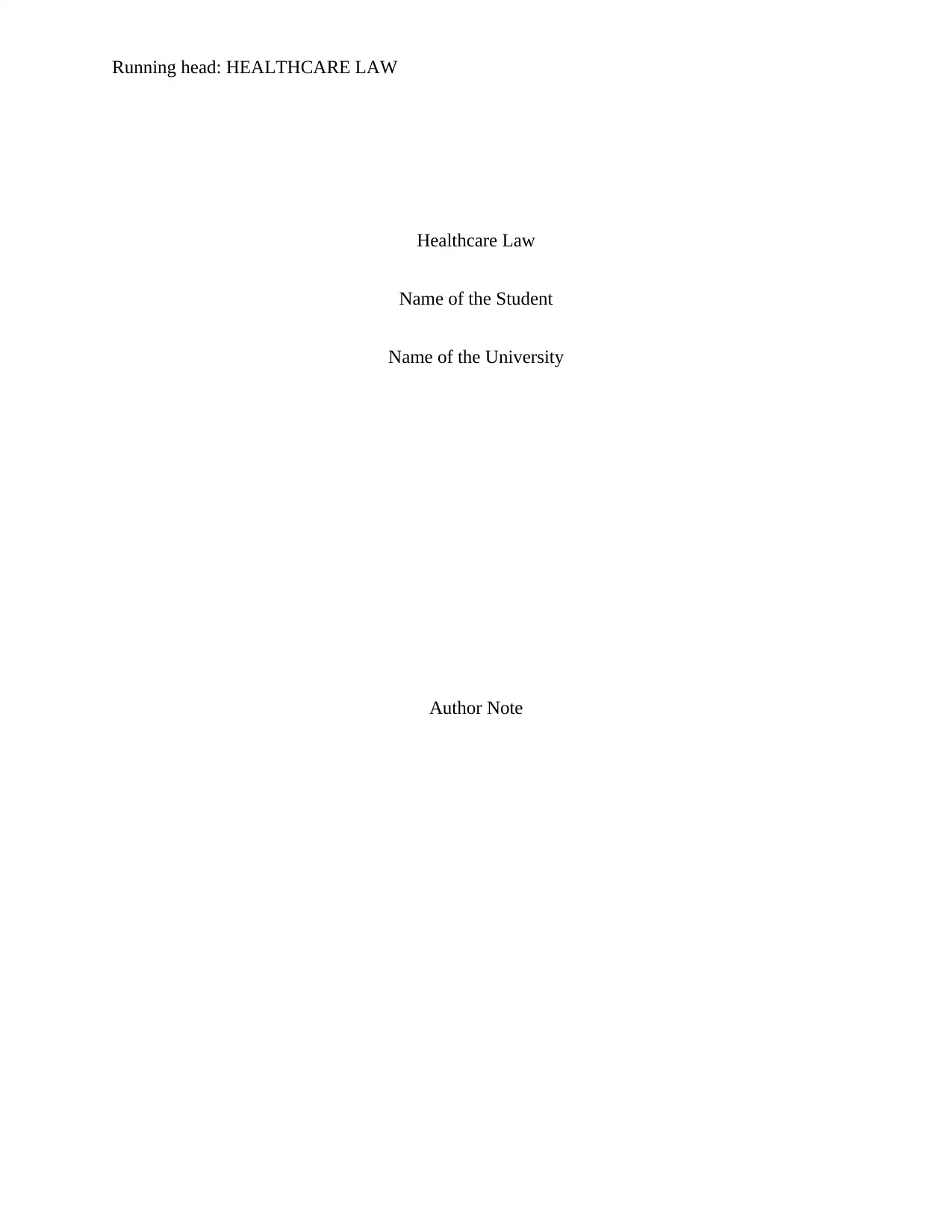
Running head: HEALTHCARE LAW
Healthcare Law
Name of the Student
Name of the University
Author Note
Healthcare Law
Name of the Student
Name of the University
Author Note
Paraphrase This Document
Need a fresh take? Get an instant paraphrase of this document with our AI Paraphraser
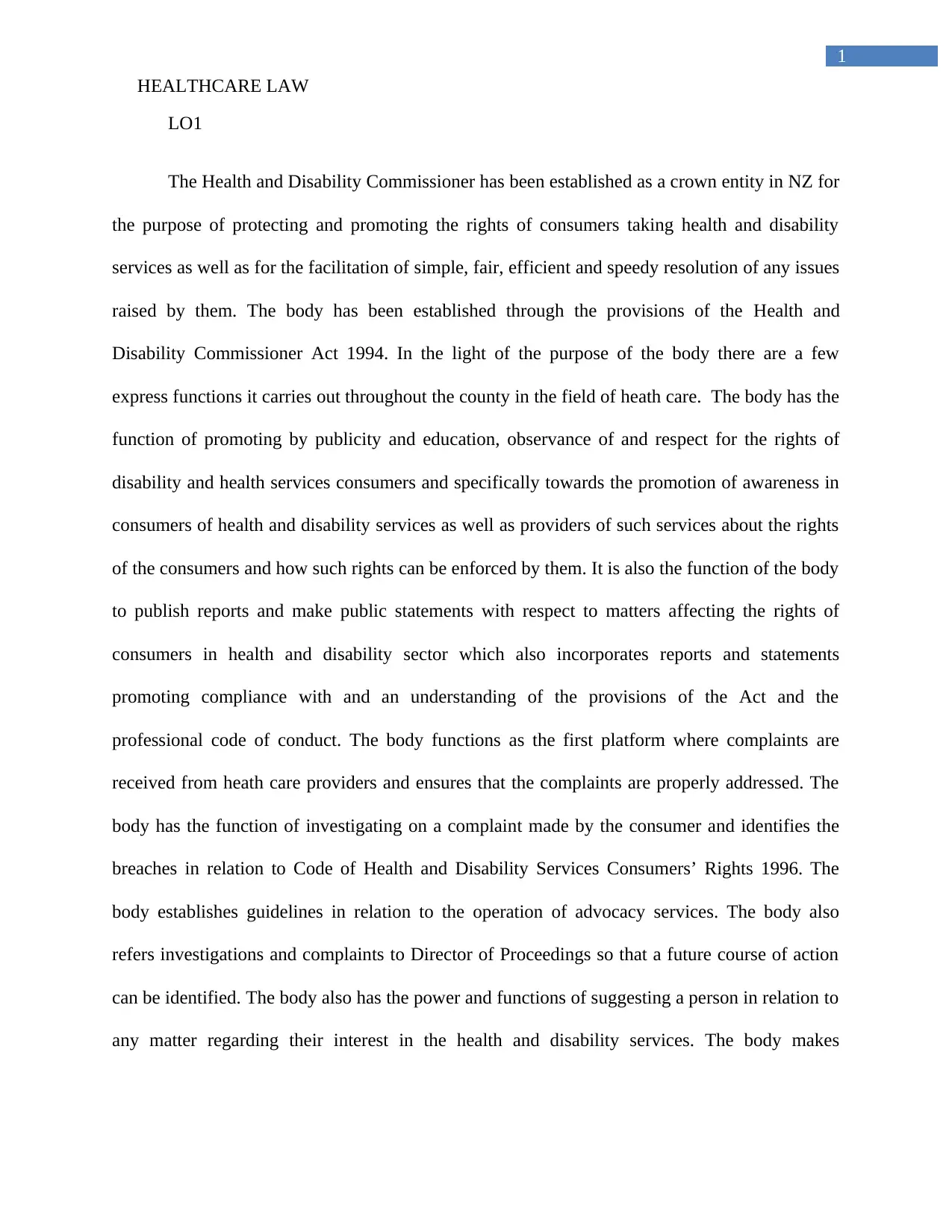
1
HEALTHCARE LAW
LO1
The Health and Disability Commissioner has been established as a crown entity in NZ for
the purpose of protecting and promoting the rights of consumers taking health and disability
services as well as for the facilitation of simple, fair, efficient and speedy resolution of any issues
raised by them. The body has been established through the provisions of the Health and
Disability Commissioner Act 1994. In the light of the purpose of the body there are a few
express functions it carries out throughout the county in the field of heath care. The body has the
function of promoting by publicity and education, observance of and respect for the rights of
disability and health services consumers and specifically towards the promotion of awareness in
consumers of health and disability services as well as providers of such services about the rights
of the consumers and how such rights can be enforced by them. It is also the function of the body
to publish reports and make public statements with respect to matters affecting the rights of
consumers in health and disability sector which also incorporates reports and statements
promoting compliance with and an understanding of the provisions of the Act and the
professional code of conduct. The body functions as the first platform where complaints are
received from heath care providers and ensures that the complaints are properly addressed. The
body has the function of investigating on a complaint made by the consumer and identifies the
breaches in relation to Code of Health and Disability Services Consumers’ Rights 1996. The
body establishes guidelines in relation to the operation of advocacy services. The body also
refers investigations and complaints to Director of Proceedings so that a future course of action
can be identified. The body also has the power and functions of suggesting a person in relation to
any matter regarding their interest in the health and disability services. The body makes
HEALTHCARE LAW
LO1
The Health and Disability Commissioner has been established as a crown entity in NZ for
the purpose of protecting and promoting the rights of consumers taking health and disability
services as well as for the facilitation of simple, fair, efficient and speedy resolution of any issues
raised by them. The body has been established through the provisions of the Health and
Disability Commissioner Act 1994. In the light of the purpose of the body there are a few
express functions it carries out throughout the county in the field of heath care. The body has the
function of promoting by publicity and education, observance of and respect for the rights of
disability and health services consumers and specifically towards the promotion of awareness in
consumers of health and disability services as well as providers of such services about the rights
of the consumers and how such rights can be enforced by them. It is also the function of the body
to publish reports and make public statements with respect to matters affecting the rights of
consumers in health and disability sector which also incorporates reports and statements
promoting compliance with and an understanding of the provisions of the Act and the
professional code of conduct. The body functions as the first platform where complaints are
received from heath care providers and ensures that the complaints are properly addressed. The
body has the function of investigating on a complaint made by the consumer and identifies the
breaches in relation to Code of Health and Disability Services Consumers’ Rights 1996. The
body establishes guidelines in relation to the operation of advocacy services. The body also
refers investigations and complaints to Director of Proceedings so that a future course of action
can be identified. The body also has the power and functions of suggesting a person in relation to
any matter regarding their interest in the health and disability services. The body makes
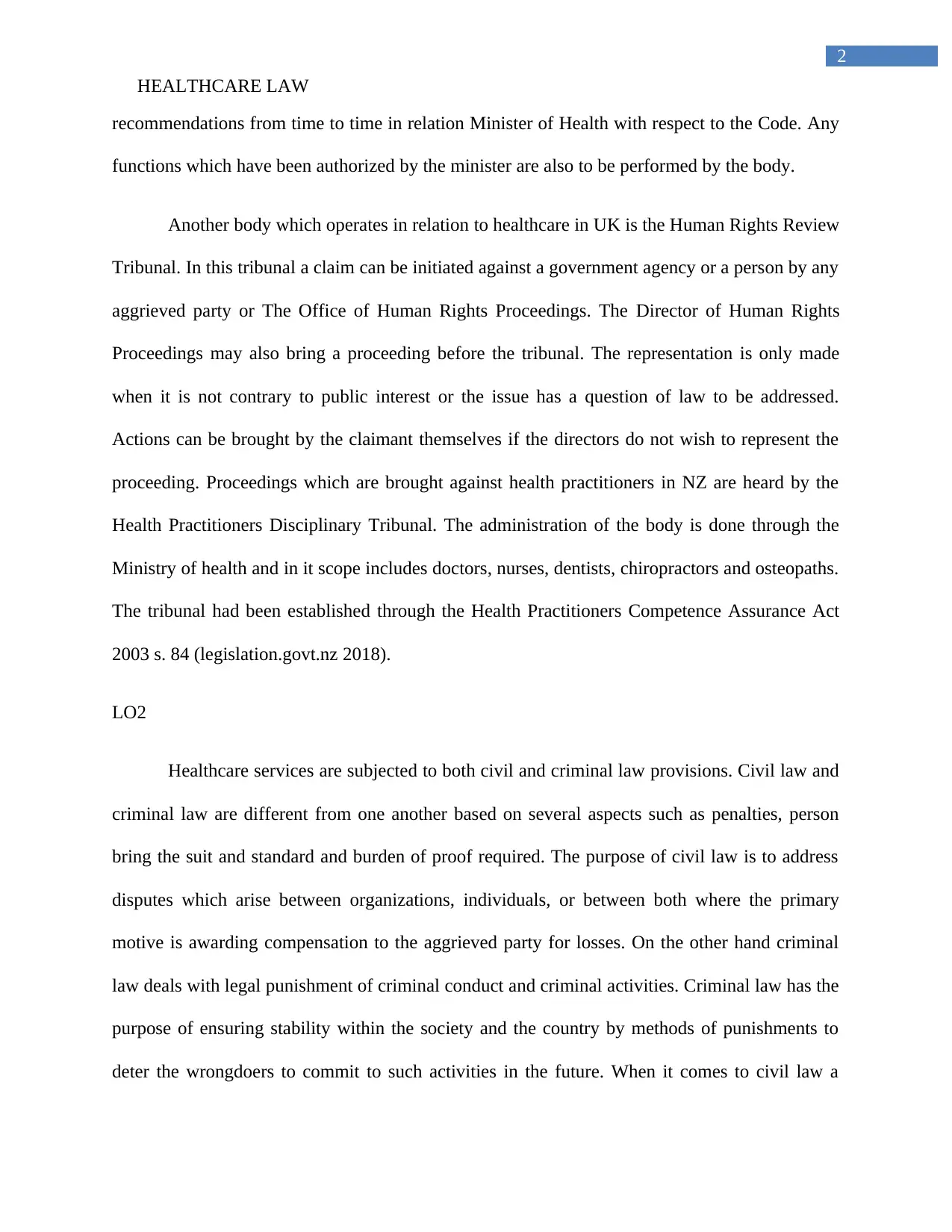
2
HEALTHCARE LAW
recommendations from time to time in relation Minister of Health with respect to the Code. Any
functions which have been authorized by the minister are also to be performed by the body.
Another body which operates in relation to healthcare in UK is the Human Rights Review
Tribunal. In this tribunal a claim can be initiated against a government agency or a person by any
aggrieved party or The Office of Human Rights Proceedings. The Director of Human Rights
Proceedings may also bring a proceeding before the tribunal. The representation is only made
when it is not contrary to public interest or the issue has a question of law to be addressed.
Actions can be brought by the claimant themselves if the directors do not wish to represent the
proceeding. Proceedings which are brought against health practitioners in NZ are heard by the
Health Practitioners Disciplinary Tribunal. The administration of the body is done through the
Ministry of health and in it scope includes doctors, nurses, dentists, chiropractors and osteopaths.
The tribunal had been established through the Health Practitioners Competence Assurance Act
2003 s. 84 (legislation.govt.nz 2018).
LO2
Healthcare services are subjected to both civil and criminal law provisions. Civil law and
criminal law are different from one another based on several aspects such as penalties, person
bring the suit and standard and burden of proof required. The purpose of civil law is to address
disputes which arise between organizations, individuals, or between both where the primary
motive is awarding compensation to the aggrieved party for losses. On the other hand criminal
law deals with legal punishment of criminal conduct and criminal activities. Criminal law has the
purpose of ensuring stability within the society and the country by methods of punishments to
deter the wrongdoers to commit to such activities in the future. When it comes to civil law a
HEALTHCARE LAW
recommendations from time to time in relation Minister of Health with respect to the Code. Any
functions which have been authorized by the minister are also to be performed by the body.
Another body which operates in relation to healthcare in UK is the Human Rights Review
Tribunal. In this tribunal a claim can be initiated against a government agency or a person by any
aggrieved party or The Office of Human Rights Proceedings. The Director of Human Rights
Proceedings may also bring a proceeding before the tribunal. The representation is only made
when it is not contrary to public interest or the issue has a question of law to be addressed.
Actions can be brought by the claimant themselves if the directors do not wish to represent the
proceeding. Proceedings which are brought against health practitioners in NZ are heard by the
Health Practitioners Disciplinary Tribunal. The administration of the body is done through the
Ministry of health and in it scope includes doctors, nurses, dentists, chiropractors and osteopaths.
The tribunal had been established through the Health Practitioners Competence Assurance Act
2003 s. 84 (legislation.govt.nz 2018).
LO2
Healthcare services are subjected to both civil and criminal law provisions. Civil law and
criminal law are different from one another based on several aspects such as penalties, person
bring the suit and standard and burden of proof required. The purpose of civil law is to address
disputes which arise between organizations, individuals, or between both where the primary
motive is awarding compensation to the aggrieved party for losses. On the other hand criminal
law deals with legal punishment of criminal conduct and criminal activities. Criminal law has the
purpose of ensuring stability within the society and the country by methods of punishments to
deter the wrongdoers to commit to such activities in the future. When it comes to civil law a
⊘ This is a preview!⊘
Do you want full access?
Subscribe today to unlock all pages.

Trusted by 1+ million students worldwide
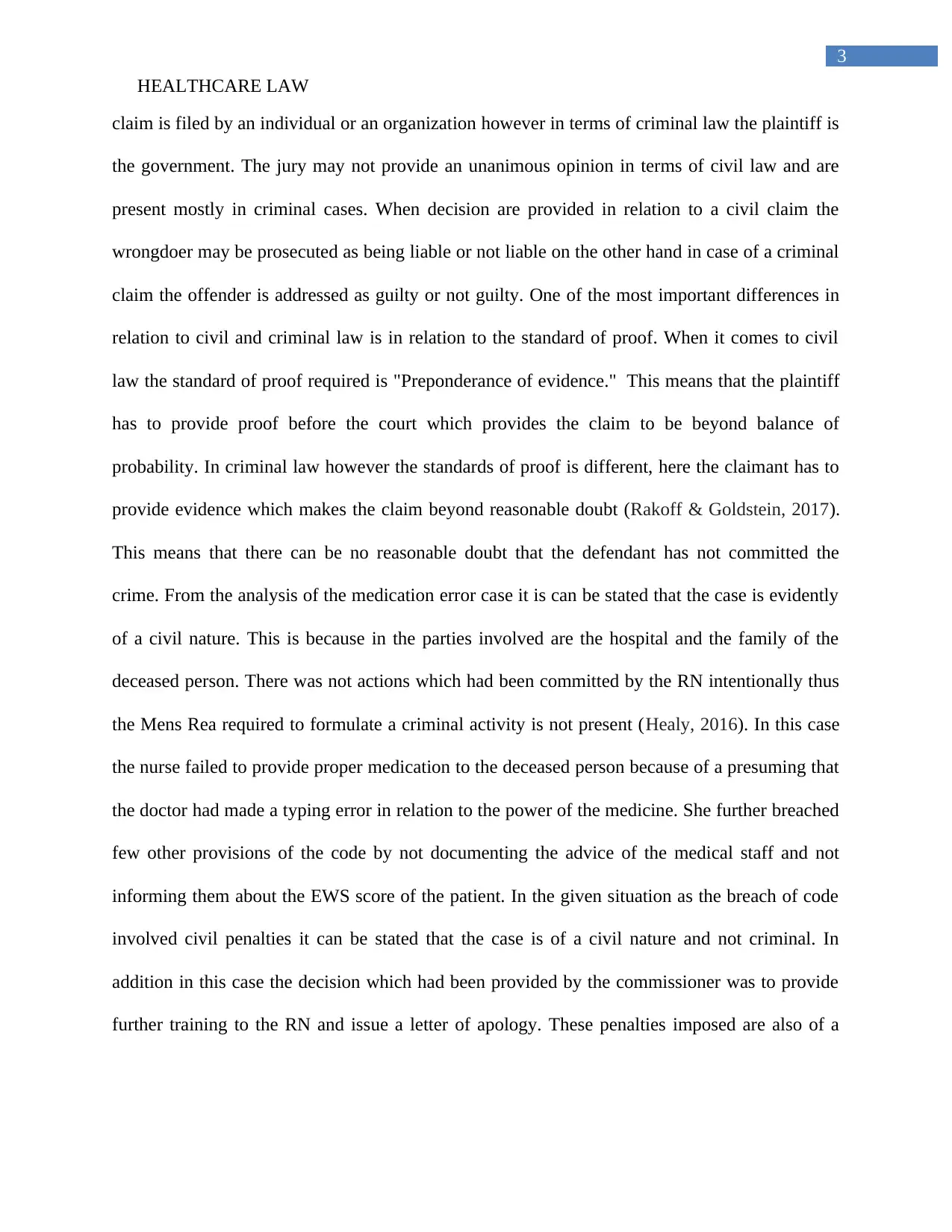
3
HEALTHCARE LAW
claim is filed by an individual or an organization however in terms of criminal law the plaintiff is
the government. The jury may not provide an unanimous opinion in terms of civil law and are
present mostly in criminal cases. When decision are provided in relation to a civil claim the
wrongdoer may be prosecuted as being liable or not liable on the other hand in case of a criminal
claim the offender is addressed as guilty or not guilty. One of the most important differences in
relation to civil and criminal law is in relation to the standard of proof. When it comes to civil
law the standard of proof required is "Preponderance of evidence." This means that the plaintiff
has to provide proof before the court which provides the claim to be beyond balance of
probability. In criminal law however the standards of proof is different, here the claimant has to
provide evidence which makes the claim beyond reasonable doubt (Rakoff & Goldstein, 2017).
This means that there can be no reasonable doubt that the defendant has not committed the
crime. From the analysis of the medication error case it is can be stated that the case is evidently
of a civil nature. This is because in the parties involved are the hospital and the family of the
deceased person. There was not actions which had been committed by the RN intentionally thus
the Mens Rea required to formulate a criminal activity is not present (Healy, 2016). In this case
the nurse failed to provide proper medication to the deceased person because of a presuming that
the doctor had made a typing error in relation to the power of the medicine. She further breached
few other provisions of the code by not documenting the advice of the medical staff and not
informing them about the EWS score of the patient. In the given situation as the breach of code
involved civil penalties it can be stated that the case is of a civil nature and not criminal. In
addition in this case the decision which had been provided by the commissioner was to provide
further training to the RN and issue a letter of apology. These penalties imposed are also of a
HEALTHCARE LAW
claim is filed by an individual or an organization however in terms of criminal law the plaintiff is
the government. The jury may not provide an unanimous opinion in terms of civil law and are
present mostly in criminal cases. When decision are provided in relation to a civil claim the
wrongdoer may be prosecuted as being liable or not liable on the other hand in case of a criminal
claim the offender is addressed as guilty or not guilty. One of the most important differences in
relation to civil and criminal law is in relation to the standard of proof. When it comes to civil
law the standard of proof required is "Preponderance of evidence." This means that the plaintiff
has to provide proof before the court which provides the claim to be beyond balance of
probability. In criminal law however the standards of proof is different, here the claimant has to
provide evidence which makes the claim beyond reasonable doubt (Rakoff & Goldstein, 2017).
This means that there can be no reasonable doubt that the defendant has not committed the
crime. From the analysis of the medication error case it is can be stated that the case is evidently
of a civil nature. This is because in the parties involved are the hospital and the family of the
deceased person. There was not actions which had been committed by the RN intentionally thus
the Mens Rea required to formulate a criminal activity is not present (Healy, 2016). In this case
the nurse failed to provide proper medication to the deceased person because of a presuming that
the doctor had made a typing error in relation to the power of the medicine. She further breached
few other provisions of the code by not documenting the advice of the medical staff and not
informing them about the EWS score of the patient. In the given situation as the breach of code
involved civil penalties it can be stated that the case is of a civil nature and not criminal. In
addition in this case the decision which had been provided by the commissioner was to provide
further training to the RN and issue a letter of apology. These penalties imposed are also of a
Paraphrase This Document
Need a fresh take? Get an instant paraphrase of this document with our AI Paraphraser
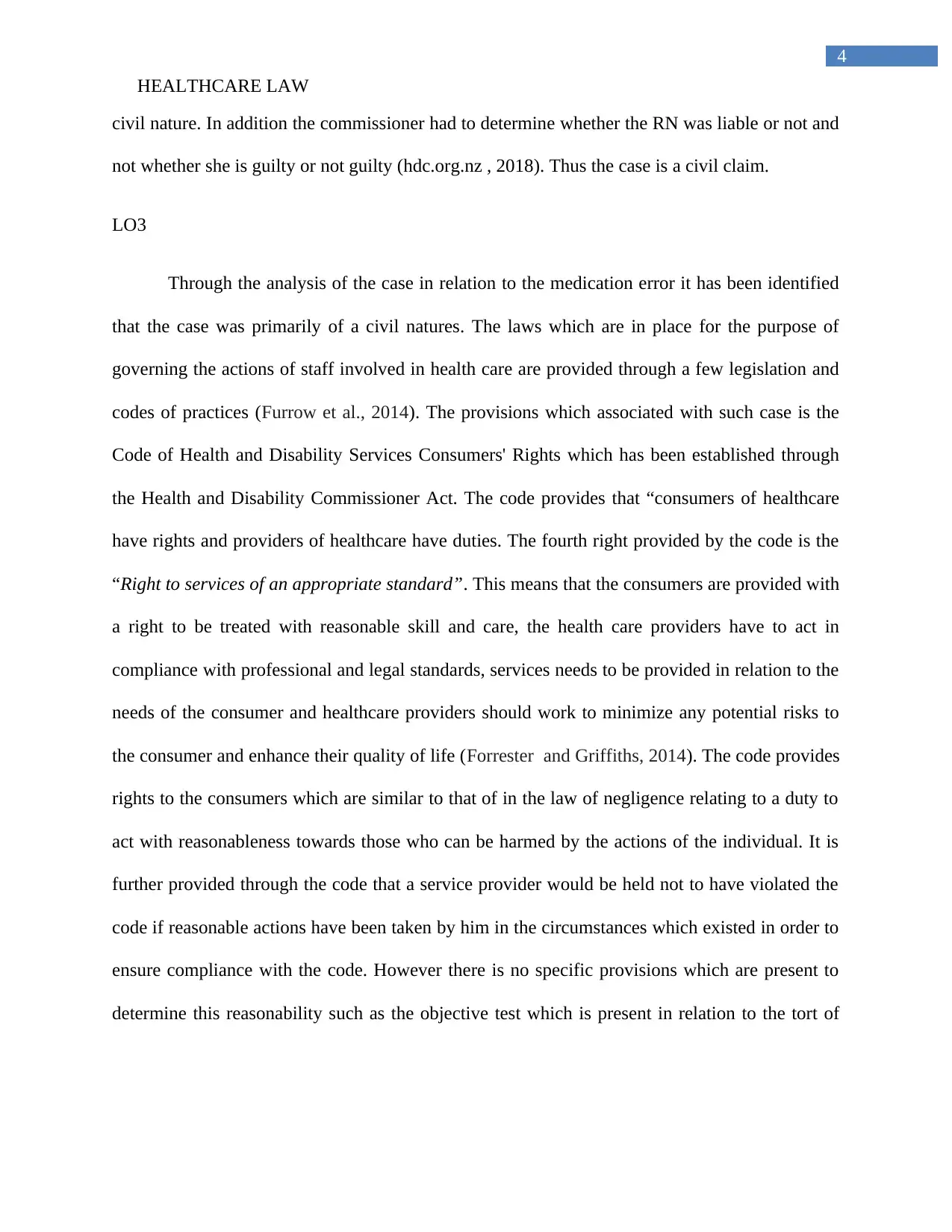
4
HEALTHCARE LAW
civil nature. In addition the commissioner had to determine whether the RN was liable or not and
not whether she is guilty or not guilty (hdc.org.nz , 2018). Thus the case is a civil claim.
LO3
Through the analysis of the case in relation to the medication error it has been identified
that the case was primarily of a civil natures. The laws which are in place for the purpose of
governing the actions of staff involved in health care are provided through a few legislation and
codes of practices (Furrow et al., 2014). The provisions which associated with such case is the
Code of Health and Disability Services Consumers' Rights which has been established through
the Health and Disability Commissioner Act. The code provides that “consumers of healthcare
have rights and providers of healthcare have duties. The fourth right provided by the code is the
“Right to services of an appropriate standard”. This means that the consumers are provided with
a right to be treated with reasonable skill and care, the health care providers have to act in
compliance with professional and legal standards, services needs to be provided in relation to the
needs of the consumer and healthcare providers should work to minimize any potential risks to
the consumer and enhance their quality of life (Forrester and Griffiths, 2014). The code provides
rights to the consumers which are similar to that of in the law of negligence relating to a duty to
act with reasonableness towards those who can be harmed by the actions of the individual. It is
further provided through the code that a service provider would be held not to have violated the
code if reasonable actions have been taken by him in the circumstances which existed in order to
ensure compliance with the code. However there is no specific provisions which are present to
determine this reasonability such as the objective test which is present in relation to the tort of
HEALTHCARE LAW
civil nature. In addition the commissioner had to determine whether the RN was liable or not and
not whether she is guilty or not guilty (hdc.org.nz , 2018). Thus the case is a civil claim.
LO3
Through the analysis of the case in relation to the medication error it has been identified
that the case was primarily of a civil natures. The laws which are in place for the purpose of
governing the actions of staff involved in health care are provided through a few legislation and
codes of practices (Furrow et al., 2014). The provisions which associated with such case is the
Code of Health and Disability Services Consumers' Rights which has been established through
the Health and Disability Commissioner Act. The code provides that “consumers of healthcare
have rights and providers of healthcare have duties. The fourth right provided by the code is the
“Right to services of an appropriate standard”. This means that the consumers are provided with
a right to be treated with reasonable skill and care, the health care providers have to act in
compliance with professional and legal standards, services needs to be provided in relation to the
needs of the consumer and healthcare providers should work to minimize any potential risks to
the consumer and enhance their quality of life (Forrester and Griffiths, 2014). The code provides
rights to the consumers which are similar to that of in the law of negligence relating to a duty to
act with reasonableness towards those who can be harmed by the actions of the individual. It is
further provided through the code that a service provider would be held not to have violated the
code if reasonable actions have been taken by him in the circumstances which existed in order to
ensure compliance with the code. However there is no specific provisions which are present to
determine this reasonability such as the objective test which is present in relation to the tort of
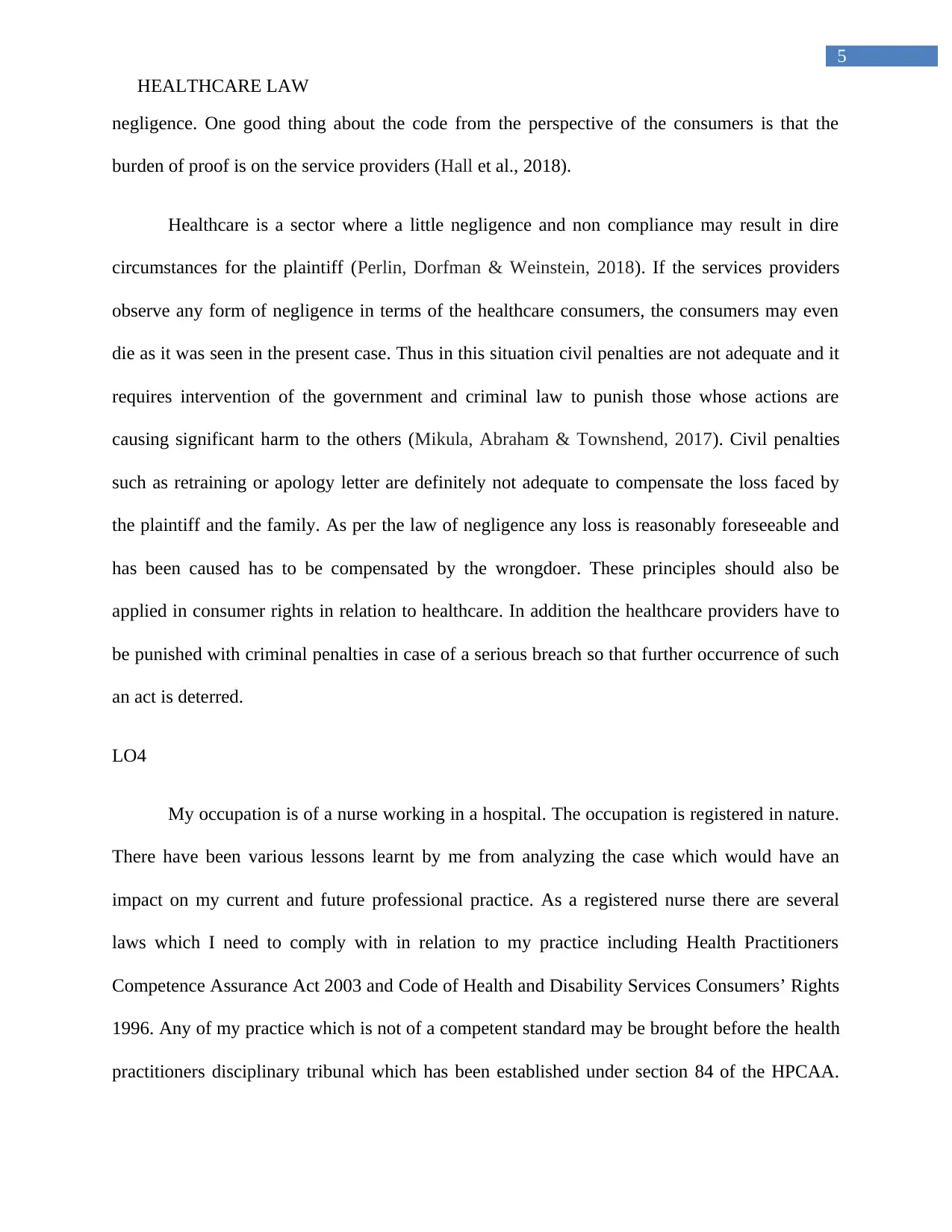
5
HEALTHCARE LAW
negligence. One good thing about the code from the perspective of the consumers is that the
burden of proof is on the service providers (Hall et al., 2018).
Healthcare is a sector where a little negligence and non compliance may result in dire
circumstances for the plaintiff (Perlin, Dorfman & Weinstein, 2018). If the services providers
observe any form of negligence in terms of the healthcare consumers, the consumers may even
die as it was seen in the present case. Thus in this situation civil penalties are not adequate and it
requires intervention of the government and criminal law to punish those whose actions are
causing significant harm to the others (Mikula, Abraham & Townshend, 2017). Civil penalties
such as retraining or apology letter are definitely not adequate to compensate the loss faced by
the plaintiff and the family. As per the law of negligence any loss is reasonably foreseeable and
has been caused has to be compensated by the wrongdoer. These principles should also be
applied in consumer rights in relation to healthcare. In addition the healthcare providers have to
be punished with criminal penalties in case of a serious breach so that further occurrence of such
an act is deterred.
LO4
My occupation is of a nurse working in a hospital. The occupation is registered in nature.
There have been various lessons learnt by me from analyzing the case which would have an
impact on my current and future professional practice. As a registered nurse there are several
laws which I need to comply with in relation to my practice including Health Practitioners
Competence Assurance Act 2003 and Code of Health and Disability Services Consumers’ Rights
1996. Any of my practice which is not of a competent standard may be brought before the health
practitioners disciplinary tribunal which has been established under section 84 of the HPCAA.
HEALTHCARE LAW
negligence. One good thing about the code from the perspective of the consumers is that the
burden of proof is on the service providers (Hall et al., 2018).
Healthcare is a sector where a little negligence and non compliance may result in dire
circumstances for the plaintiff (Perlin, Dorfman & Weinstein, 2018). If the services providers
observe any form of negligence in terms of the healthcare consumers, the consumers may even
die as it was seen in the present case. Thus in this situation civil penalties are not adequate and it
requires intervention of the government and criminal law to punish those whose actions are
causing significant harm to the others (Mikula, Abraham & Townshend, 2017). Civil penalties
such as retraining or apology letter are definitely not adequate to compensate the loss faced by
the plaintiff and the family. As per the law of negligence any loss is reasonably foreseeable and
has been caused has to be compensated by the wrongdoer. These principles should also be
applied in consumer rights in relation to healthcare. In addition the healthcare providers have to
be punished with criminal penalties in case of a serious breach so that further occurrence of such
an act is deterred.
LO4
My occupation is of a nurse working in a hospital. The occupation is registered in nature.
There have been various lessons learnt by me from analyzing the case which would have an
impact on my current and future professional practice. As a registered nurse there are several
laws which I need to comply with in relation to my practice including Health Practitioners
Competence Assurance Act 2003 and Code of Health and Disability Services Consumers’ Rights
1996. Any of my practice which is not of a competent standard may be brought before the health
practitioners disciplinary tribunal which has been established under section 84 of the HPCAA.
⊘ This is a preview!⊘
Do you want full access?
Subscribe today to unlock all pages.

Trusted by 1+ million students worldwide
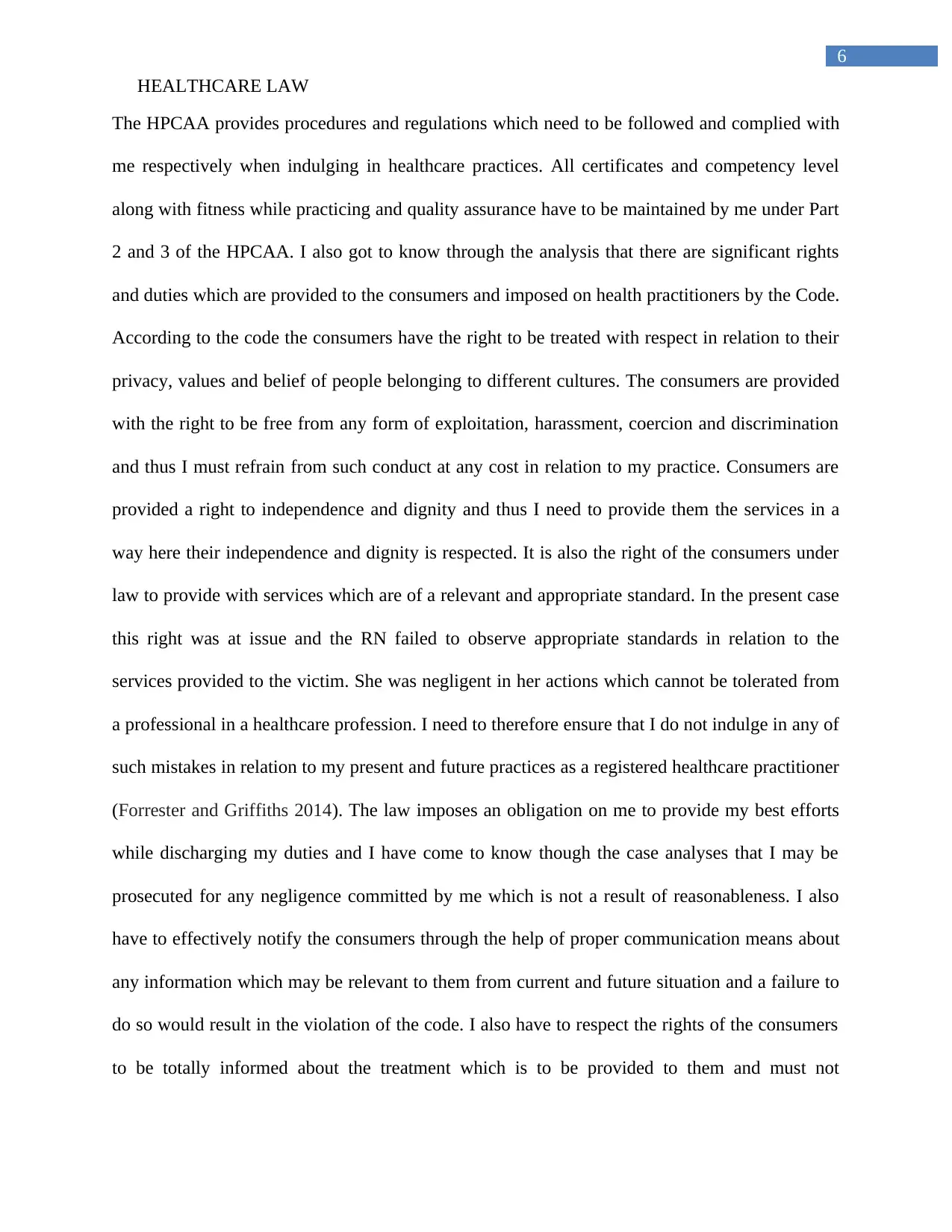
6
HEALTHCARE LAW
The HPCAA provides procedures and regulations which need to be followed and complied with
me respectively when indulging in healthcare practices. All certificates and competency level
along with fitness while practicing and quality assurance have to be maintained by me under Part
2 and 3 of the HPCAA. I also got to know through the analysis that there are significant rights
and duties which are provided to the consumers and imposed on health practitioners by the Code.
According to the code the consumers have the right to be treated with respect in relation to their
privacy, values and belief of people belonging to different cultures. The consumers are provided
with the right to be free from any form of exploitation, harassment, coercion and discrimination
and thus I must refrain from such conduct at any cost in relation to my practice. Consumers are
provided a right to independence and dignity and thus I need to provide them the services in a
way here their independence and dignity is respected. It is also the right of the consumers under
law to provide with services which are of a relevant and appropriate standard. In the present case
this right was at issue and the RN failed to observe appropriate standards in relation to the
services provided to the victim. She was negligent in her actions which cannot be tolerated from
a professional in a healthcare profession. I need to therefore ensure that I do not indulge in any of
such mistakes in relation to my present and future practices as a registered healthcare practitioner
(Forrester and Griffiths 2014). The law imposes an obligation on me to provide my best efforts
while discharging my duties and I have come to know though the case analyses that I may be
prosecuted for any negligence committed by me which is not a result of reasonableness. I also
have to effectively notify the consumers through the help of proper communication means about
any information which may be relevant to them from current and future situation and a failure to
do so would result in the violation of the code. I also have to respect the rights of the consumers
to be totally informed about the treatment which is to be provided to them and must not
HEALTHCARE LAW
The HPCAA provides procedures and regulations which need to be followed and complied with
me respectively when indulging in healthcare practices. All certificates and competency level
along with fitness while practicing and quality assurance have to be maintained by me under Part
2 and 3 of the HPCAA. I also got to know through the analysis that there are significant rights
and duties which are provided to the consumers and imposed on health practitioners by the Code.
According to the code the consumers have the right to be treated with respect in relation to their
privacy, values and belief of people belonging to different cultures. The consumers are provided
with the right to be free from any form of exploitation, harassment, coercion and discrimination
and thus I must refrain from such conduct at any cost in relation to my practice. Consumers are
provided a right to independence and dignity and thus I need to provide them the services in a
way here their independence and dignity is respected. It is also the right of the consumers under
law to provide with services which are of a relevant and appropriate standard. In the present case
this right was at issue and the RN failed to observe appropriate standards in relation to the
services provided to the victim. She was negligent in her actions which cannot be tolerated from
a professional in a healthcare profession. I need to therefore ensure that I do not indulge in any of
such mistakes in relation to my present and future practices as a registered healthcare practitioner
(Forrester and Griffiths 2014). The law imposes an obligation on me to provide my best efforts
while discharging my duties and I have come to know though the case analyses that I may be
prosecuted for any negligence committed by me which is not a result of reasonableness. I also
have to effectively notify the consumers through the help of proper communication means about
any information which may be relevant to them from current and future situation and a failure to
do so would result in the violation of the code. I also have to respect the rights of the consumers
to be totally informed about the treatment which is to be provided to them and must not
Paraphrase This Document
Need a fresh take? Get an instant paraphrase of this document with our AI Paraphraser
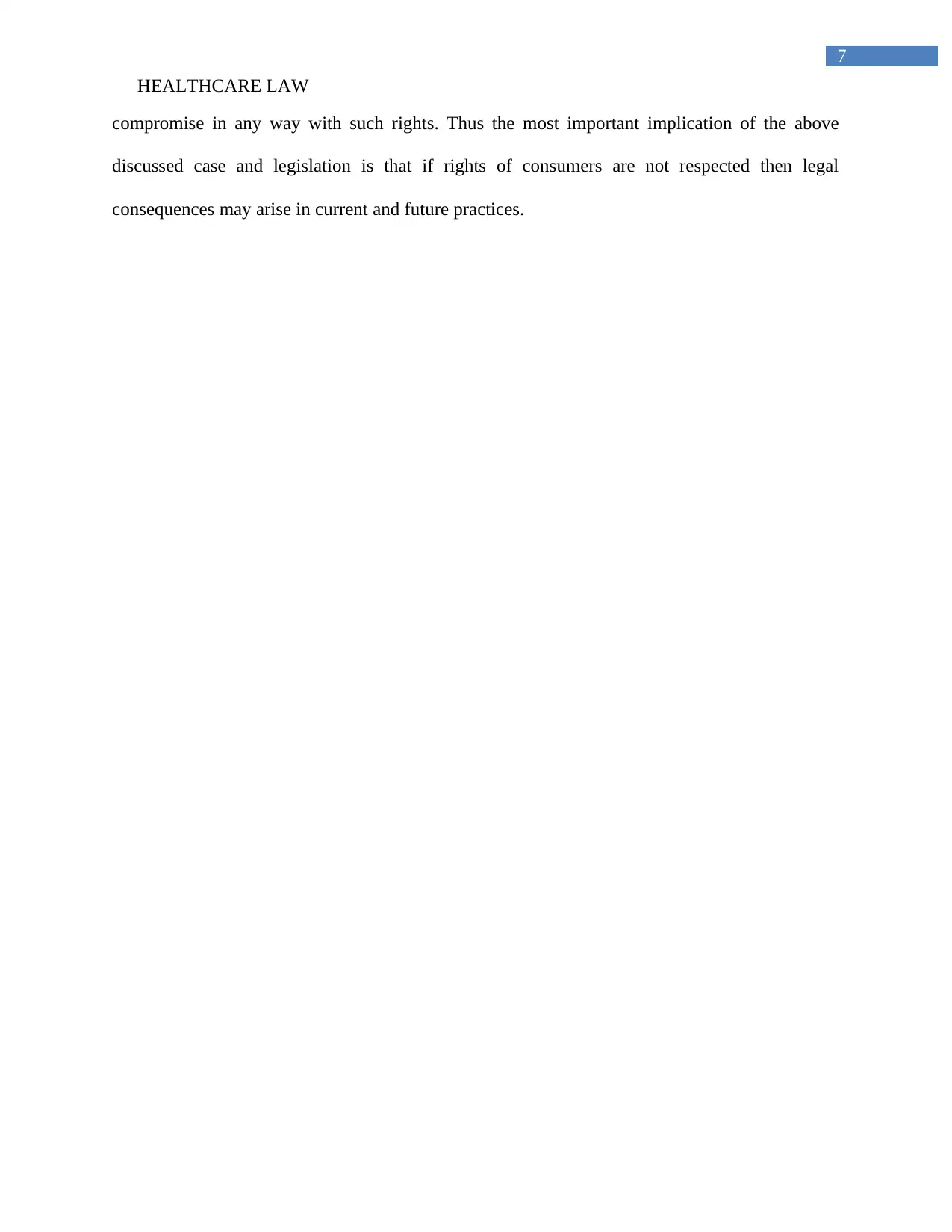
7
HEALTHCARE LAW
compromise in any way with such rights. Thus the most important implication of the above
discussed case and legislation is that if rights of consumers are not respected then legal
consequences may arise in current and future practices.
HEALTHCARE LAW
compromise in any way with such rights. Thus the most important implication of the above
discussed case and legislation is that if rights of consumers are not respected then legal
consequences may arise in current and future practices.
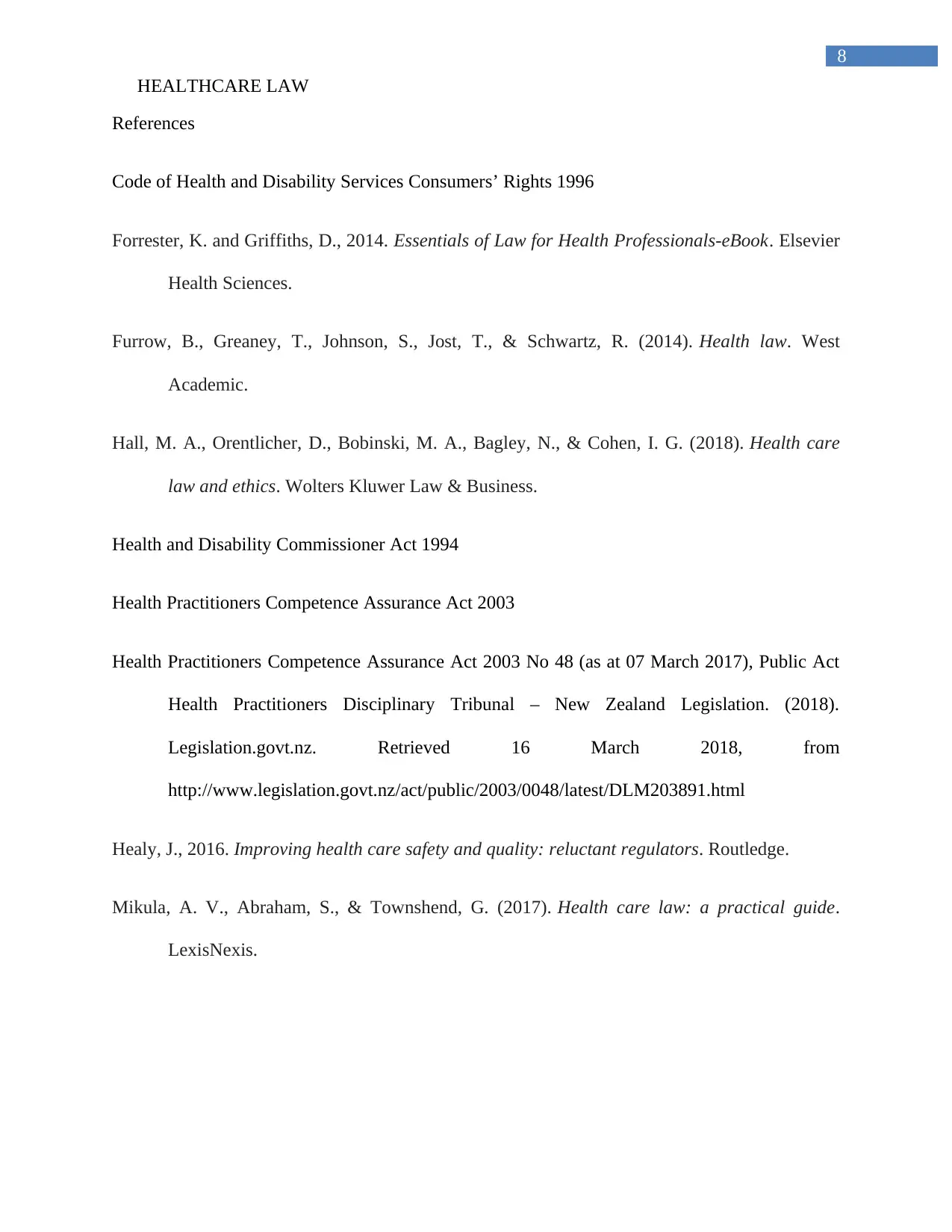
8
HEALTHCARE LAW
References
Code of Health and Disability Services Consumers’ Rights 1996
Forrester, K. and Griffiths, D., 2014. Essentials of Law for Health Professionals-eBook. Elsevier
Health Sciences.
Furrow, B., Greaney, T., Johnson, S., Jost, T., & Schwartz, R. (2014). Health law. West
Academic.
Hall, M. A., Orentlicher, D., Bobinski, M. A., Bagley, N., & Cohen, I. G. (2018). Health care
law and ethics. Wolters Kluwer Law & Business.
Health and Disability Commissioner Act 1994
Health Practitioners Competence Assurance Act 2003
Health Practitioners Competence Assurance Act 2003 No 48 (as at 07 March 2017), Public Act
Health Practitioners Disciplinary Tribunal – New Zealand Legislation. (2018).
Legislation.govt.nz. Retrieved 16 March 2018, from
http://www.legislation.govt.nz/act/public/2003/0048/latest/DLM203891.html
Healy, J., 2016. Improving health care safety and quality: reluctant regulators. Routledge.
Mikula, A. V., Abraham, S., & Townshend, G. (2017). Health care law: a practical guide.
LexisNexis.
HEALTHCARE LAW
References
Code of Health and Disability Services Consumers’ Rights 1996
Forrester, K. and Griffiths, D., 2014. Essentials of Law for Health Professionals-eBook. Elsevier
Health Sciences.
Furrow, B., Greaney, T., Johnson, S., Jost, T., & Schwartz, R. (2014). Health law. West
Academic.
Hall, M. A., Orentlicher, D., Bobinski, M. A., Bagley, N., & Cohen, I. G. (2018). Health care
law and ethics. Wolters Kluwer Law & Business.
Health and Disability Commissioner Act 1994
Health Practitioners Competence Assurance Act 2003
Health Practitioners Competence Assurance Act 2003 No 48 (as at 07 March 2017), Public Act
Health Practitioners Disciplinary Tribunal – New Zealand Legislation. (2018).
Legislation.govt.nz. Retrieved 16 March 2018, from
http://www.legislation.govt.nz/act/public/2003/0048/latest/DLM203891.html
Healy, J., 2016. Improving health care safety and quality: reluctant regulators. Routledge.
Mikula, A. V., Abraham, S., & Townshend, G. (2017). Health care law: a practical guide.
LexisNexis.
⊘ This is a preview!⊘
Do you want full access?
Subscribe today to unlock all pages.

Trusted by 1+ million students worldwide
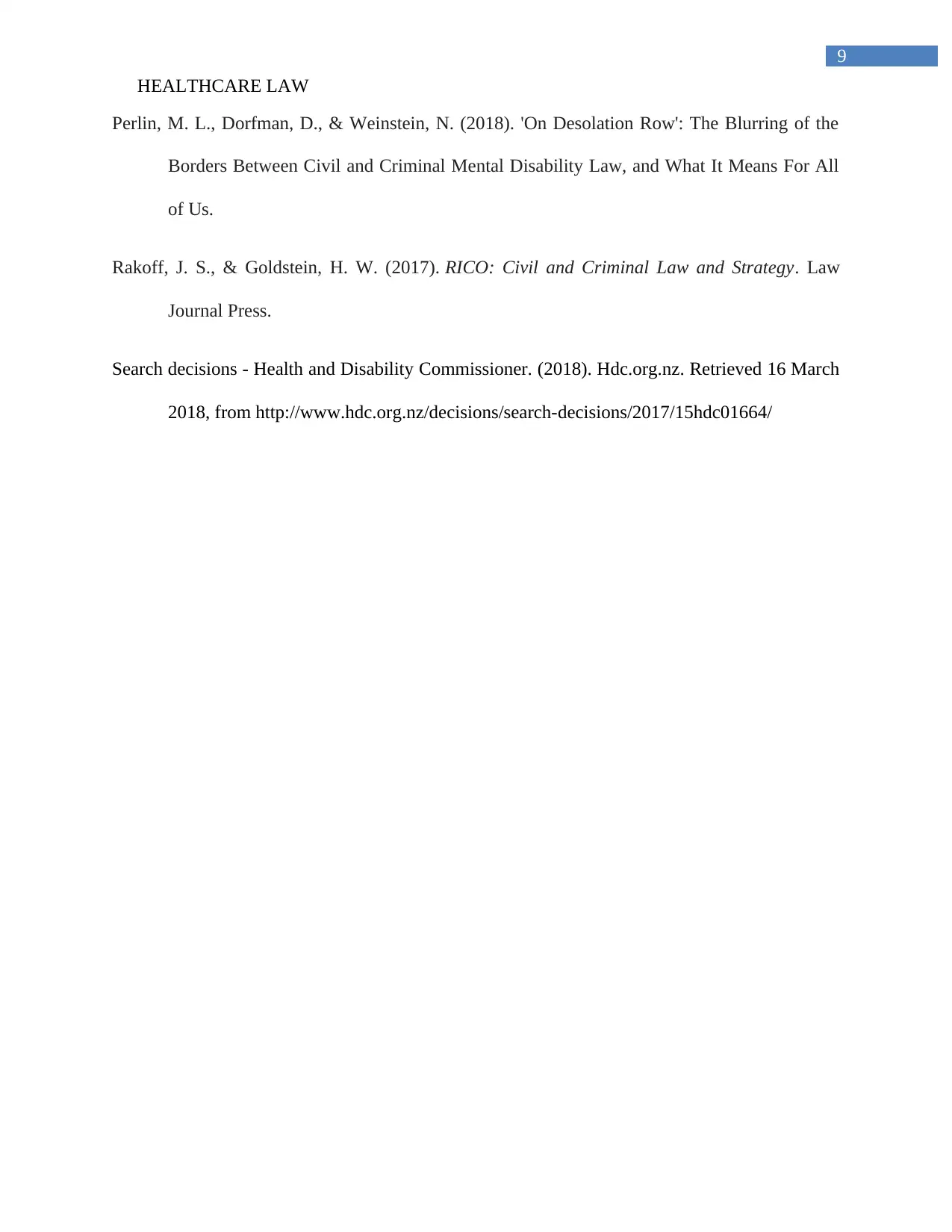
9
HEALTHCARE LAW
Perlin, M. L., Dorfman, D., & Weinstein, N. (2018). 'On Desolation Row': The Blurring of the
Borders Between Civil and Criminal Mental Disability Law, and What It Means For All
of Us.
Rakoff, J. S., & Goldstein, H. W. (2017). RICO: Civil and Criminal Law and Strategy. Law
Journal Press.
Search decisions - Health and Disability Commissioner. (2018). Hdc.org.nz. Retrieved 16 March
2018, from http://www.hdc.org.nz/decisions/search-decisions/2017/15hdc01664/
HEALTHCARE LAW
Perlin, M. L., Dorfman, D., & Weinstein, N. (2018). 'On Desolation Row': The Blurring of the
Borders Between Civil and Criminal Mental Disability Law, and What It Means For All
of Us.
Rakoff, J. S., & Goldstein, H. W. (2017). RICO: Civil and Criminal Law and Strategy. Law
Journal Press.
Search decisions - Health and Disability Commissioner. (2018). Hdc.org.nz. Retrieved 16 March
2018, from http://www.hdc.org.nz/decisions/search-decisions/2017/15hdc01664/
1 out of 10
Related Documents
Your All-in-One AI-Powered Toolkit for Academic Success.
+13062052269
info@desklib.com
Available 24*7 on WhatsApp / Email
![[object Object]](/_next/static/media/star-bottom.7253800d.svg)
Unlock your academic potential
Copyright © 2020–2025 A2Z Services. All Rights Reserved. Developed and managed by ZUCOL.





